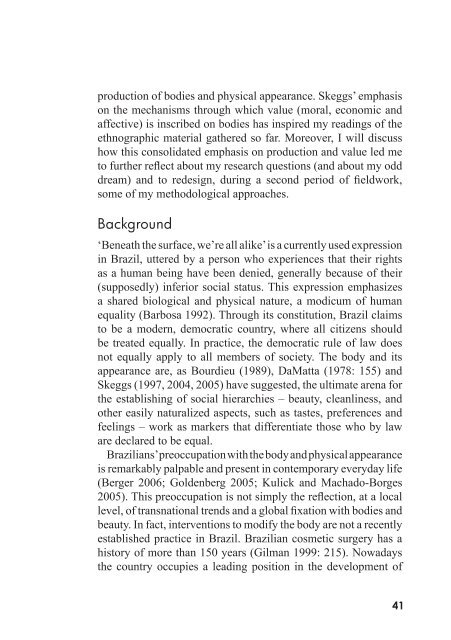Thinking with Bevereley Skeggs - Stockholms universitet
Thinking with Bevereley Skeggs - Stockholms universitet
Thinking with Bevereley Skeggs - Stockholms universitet
- No tags were found...
Create successful ePaper yourself
Turn your PDF publications into a flip-book with our unique Google optimized e-Paper software.
production of bodies and physical appearance. <strong>Skeggs</strong>’ emphasison the mechanisms through which value (moral, economic andaffective) is inscribed on bodies has inspired my readings of theethnographic material gathered so far. Moreover, I will discusshow this consolidated emphasis on production and value led meto further reflect about my research questions (and about my odddream) and to redesign, during a second period of fieldwork,some of my methodological approaches.Background‘Beneath the surface, we’re all alike’ is a currently used expressionin Brazil, uttered by a person who experiences that their rightsas a human being have been denied, generally because of their(supposedly) inferior social status. This expression emphasizesa shared biological and physical nature, a modicum of humanequality (Barbosa 1992). Through its constitution, Brazil claimsto be a modern, democratic country, where all citizens shouldbe treated equally. In practice, the democratic rule of law doesnot equally apply to all members of society. The body and itsappearance are, as Bourdieu (1989), DaMatta (1978: 155) and<strong>Skeggs</strong> (1997, 2004, 2005) have suggested, the ultimate arena forthe establishing of social hierarchies – beauty, cleanliness, andother easily naturalized aspects, such as tastes, preferences andfeelings – work as markers that differentiate those who by laware declared to be equal.Brazilians’ preoccupation <strong>with</strong> the body and physical appearanceis remarkably palpable and present in contemporary everyday life(Berger 2006; Goldenberg 2005; Kulick and Machado-Borges2005). This preoccupation is not simply the reflection, at a locallevel, of transnational trends and a global fixation <strong>with</strong> bodies andbeauty. In fact, interventions to modify the body are not a recentlyestablished practice in Brazil. Brazilian cosmetic surgery has ahistory of more than 150 years (Gilman 1999: 215). Nowadaysthe country occupies a leading position in the development of41
















